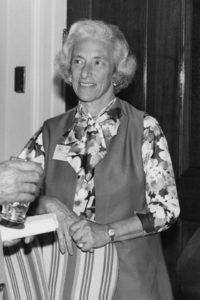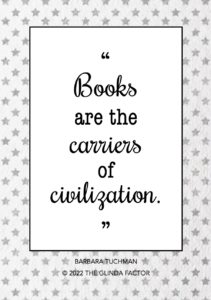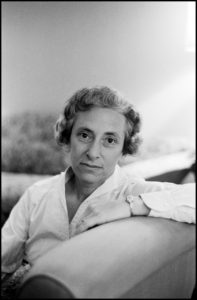
Amazing Artist
She grew up in Manhattan as part of a prominent Jewish family. While in school, she focused on literature and history. Then she jumped at every chance she could to work abroad, gaining experience in research and journalism along the way. Her career took a backseat while she married and focused on raising their three daughters. As they grew older, however, she returned to her first love – writing about history. Her goal was to bring the past alive for the general public. Join the Pulitzer Committee in 1963 as they award the prize for General Nonfiction to Barbara Tuchman…
Her Ruby Shoe Moment
The Power of the Wand
Her Yellow Brick Road
Brains, Heart & Courage
Glinda’s Gallery
Just the Facts
Her Ruby Shoe Moment
On Sunday, February 18, 1962, Barbara Tuchman opened the New York Times and turned to its book section. She nearly dropped her coffee as she saw that her most recent book, The Guns of August, was Number 10 on the best seller list for nonfiction. She hadn’t expected such a positive reaction to her history book about the beginning of World War I. But she was thrilled that it had such wide appeal.

Barbara Tuchman, American Jewish Historical Society
The Guns of August was Barbara’s fourth book to be published. When writing nonfiction, her goal was to bring the past alive for the average American. She focused on telling a vivid story and breathing life into complex historical characters. And she conducted extensive research, traveling to historic sites and reviewing primary documents in various archives. She took countless notes on 4 x 6 notecards — the small size required her to discard unnecessary details and allowed her to experiment with different story structures.
Most of the book reviews for The Guns of August were enthusiastic and positive. A few of the reviews were mixed, however, especially from the academic world. Her greatest criticism was that she didn’t have any advanced degree (master’s or PhD). Barbara viewed her lack of an advanced degree as a strength, not weakness. In her opinion, most books by academic historians were so dense and over-detailed that they didn’t appeal to the general public.
The Guns of August sold over 250,000 copies during its first year of print and spent more than 40 weeks on the New York Times best seller list. In addition, it was translated into 13 languages and made into a documentary film in 1964. From its first edition until today, it has never been out of print.
 Copies of The Guns of August even made it into the White House. Legend says that President John F Kennedy received a copy of the book from his Secretary of Defense, Robert McNamara (who was friends with Barbara). JFK was an avid reader of history and loved the book. Even more, JFK asked the members of his staff to read The Guns of August. He also ordered that the book be distributed to every American military base around the world. He may have even presented the book to foreign diplomats as a gift.
Copies of The Guns of August even made it into the White House. Legend says that President John F Kennedy received a copy of the book from his Secretary of Defense, Robert McNamara (who was friends with Barbara). JFK was an avid reader of history and loved the book. Even more, JFK asked the members of his staff to read The Guns of August. He also ordered that the book be distributed to every American military base around the world. He may have even presented the book to foreign diplomats as a gift.
According to documents and interviews, The Guns of August made such an impression on JFK that it influenced his actions during the Cuban Missile Crisis. He chose to take a cautious approach and exhaust every diplomatic option, instead of the military action that some of his advisors preferred. He said to his brother, Robert:
“I am not going to follow a course which will allow anyone to write a comparable book about this time. The Missiles of October. If anybody is around to write after this, they are going to understand that we made every effort to find peace and every effort to give our adversary room to move.”
The Pulitzer Prize committee members seemed to agree JFK’s assessment of The Guns of August — Barbara received the Pulitzer Prize for General Nonfiction in 1963. She went on to earned a second Pulitzer Prize in 1972 for her biography about General Joseph Stilwell, Stilwell and the American Experience in China, 1911-1945. She remains one of only a few authors to win multiple Pulitzers.
The Power of the Wand
Barbara Tuchman was one of America’s most popular historians in the second half of the 20th century. She once said that “the art of writing interests me as much as the art of history.” Her goal was to share complex issues in a way that held her reader’s attention. She wrote page-turning history books for the general public. Today, organizations such as Girls Write Now provide support and opportunities for the next generation of writers and leaders.
Her Yellow Brick Road
In 1933, Barbara’s father bought a magazine, The Nation. And she jumped at the opportunity to get some experience in journalism. Barbara worked up the ranks until he sold the magazine in 1937. Initially she did research for the editorial staff — she clipped newspaper articles that they requested for their articles. But she kept an eye out for any opportunity to write some articles herself. Before long, she became a staff writer and eventually a foreign correspondent.
 Barbara’s big break came in 1937, when The Nation needed someone to travel to Spain and cover the Spanish Civil War. Barbara left immediately and spent time in both Valencia and Madrid. She forwarded her articles to The Nation headquarters in New York, but also did freelance work for other publications.
Barbara’s big break came in 1937, when The Nation needed someone to travel to Spain and cover the Spanish Civil War. Barbara left immediately and spent time in both Valencia and Madrid. She forwarded her articles to The Nation headquarters in New York, but also did freelance work for other publications.
Then Barbara traveled to London. While there, she witnessed the tensions in Europe as a result of Hitler’s rise to power. She also researched the history of diplomatic relations between England and Spain, which inspired her to write to her first book, The Lost British Policy: Britain and Spain Since 1700. It was published in 1938, right before she returned to America. And she was hooked.
Barbara returned to America in 1939 and married Lester Tuchman, a physician, one year later. She had to put her career dreams as a historian aside, however. Their first daughter was born about nine months later. And then Pearl Harbor changed America forever. Dr. Tuchman enlisted as part of the Medical Corps and served abroad during World War II. Barbara stayed in New York, but was determined to find a way to help with the War effort.
 Barbara worked at the Office of War Information in Manhattan. As part of her responsibilities, she researched and edited the news from Asia, which was distributed within the Armed Services. In addition, she wrote articles about the war effort in the South Pacific that were broadcast throughout Europe.
Barbara worked at the Office of War Information in Manhattan. As part of her responsibilities, she researched and edited the news from Asia, which was distributed within the Armed Services. In addition, she wrote articles about the war effort in the South Pacific that were broadcast throughout Europe.
After the War ended, Barbara focused on raising their three daughters. But she never gave up on her dream. She spent more time on her research projects as their daughters grew older. Before long, she was conducting research at the library while they were at school. She felt fortunate that they could afford to hire help around the house, which made it possible for her to focus on her writing career.
Because of her Jewish background, she was fascinated by creation of Israel as a nation and the role of England in the same. The result was her second book, Bible and the Sword: England and Palestine from the Bronze Age to Balfour in 1956.
Brains, Heart & Courage
Barbara Wertheim grew up in Manhattan as part of an influential Jewish family. She read voraciously as a child; some of her favorite authors were Sir Arthur Conan Doyle (Sherlock Holmes), Jane Porter, and Alexander Dumas. In addition, she spent many summers vacationing in Europe with her family. Barbara attended the Walden School, a private school that allowed students the freedom to chose their areas of study — she focused on literature and history.
 Barbara attended Radcliffe College, a women’s college in Cambridge, Massachusetts. She received a BA in history in 1933. Her favorite place to study was the Widener Library at Harvard University. In fact, she had a private carrel in the British history section, where she worked on her honors thesis titled “The Moral Justification of the British Empire.”
Barbara attended Radcliffe College, a women’s college in Cambridge, Massachusetts. She received a BA in history in 1933. Her favorite place to study was the Widener Library at Harvard University. In fact, she had a private carrel in the British history section, where she worked on her honors thesis titled “The Moral Justification of the British Empire.”
Barbara thought about graduate school, but decided that she wanted to get out and experience the world. So, she went to London with her grandfather for the World Economic Conference. She witnessed leaders in both economics and government work together to try to end the Great Depression. And she found it fascinating.
After her return to America, Barbara looked for other opportunities to go abroad. She volunteered to work as a research assistant at the Institute for Pacific Relations, and spent one year inTokyo. While there, she worked on the Economic Handbook of the Pacific Region, which was published in 1934 — it summarized the political and economic landscape of nations and colonies in the area, including Australia, the South Pacific Islands, New Zealand, the Philippine islands, Korea, China, and Japan.
Glinda’s Gallery
Just the Facts
- Barbara Wertheim born on January 30, 1912, in New York City. She had two sisters. Her father was a banker and a leader in many prominent Jewish organizations with New York City. Her mother’ was part of the Morgenthau family and her relatives held powerful positions such as the Secretary of Treasury under FDR.
- Barbara was educated at Walden School in New York City, then graduated from Radcliffe College inn Cambridge, Massachusetts.
- Barbara worked as a research assistant and journalist overseas from 1933-1939, when she returned too American on the cusp of World War II.
- On June 18, 1940, Barbara married Dr. Lester Tuchman. They had three daughters — Lucy, Jessica, and Alma.
- Barbara published the following books: The Lost British Policy: Britain and Spain Since 1700; Bible and Sword: England and Palestine from the Bronze Age to Balfour; The Zimmermann Telegram; The Guns of August; The Proud Tower: A Portrait of the World before the War, 1890–1914; Stilwell and the American Experience in China, 1911–45; Notes from China; A Distant Mirror: The Calamitous Fourteenth Century; Practicing History: Selected Essays; The March of Folly: From Troy to Vietnam; The First Salute: A View of the American Revolution.
- Barbara received the following awards: two Pulitzer Prizes, St. Louis Literary Award, and National Book Award for Nonfiction. In addition, she was elected a Fellow of the American Academy of Arts and Sciences, president of the American Academy of Arts and Letters, and selected for the Jefferson Lecture by the National Endowment for the Humanities. She was also trustee of Radcliffe College and received honorary degrees from a number of universities.
- Barbara died on February 6, 1989, in Greenwich, Connecticut. She had a stroke and never fully recovered. Her papers are held at Yale University.
Want to Know More?
Brody, Seymour. Jewish Heroes & Heroines of America: 150 True Stories of American Jewish Heroism. Hollywood FL: Lifetime Books, Inc., 1996.
Hindley, Meredith. “The Dramatist.” Humanities, The Magazine of the National Endowment for the Humanities. September/October 2012, Volume 33, Number 5 (https://www.neh.gov/humanities/2012/septemberoctober/feature/the-dramatist)
Pace, Eric. “Barbara Tuchman Dead at 77; A Pulitzer Winning Historian.” New York Times, February 7, 1989.
Pollak, Oliver. “Barbara W. Tuchman.” Jewish Women’s Archive, January 30, 1912–February 6, 1989 (https://jwa.org/encyclopedia/article/tuchman-barbara-wertheim)
